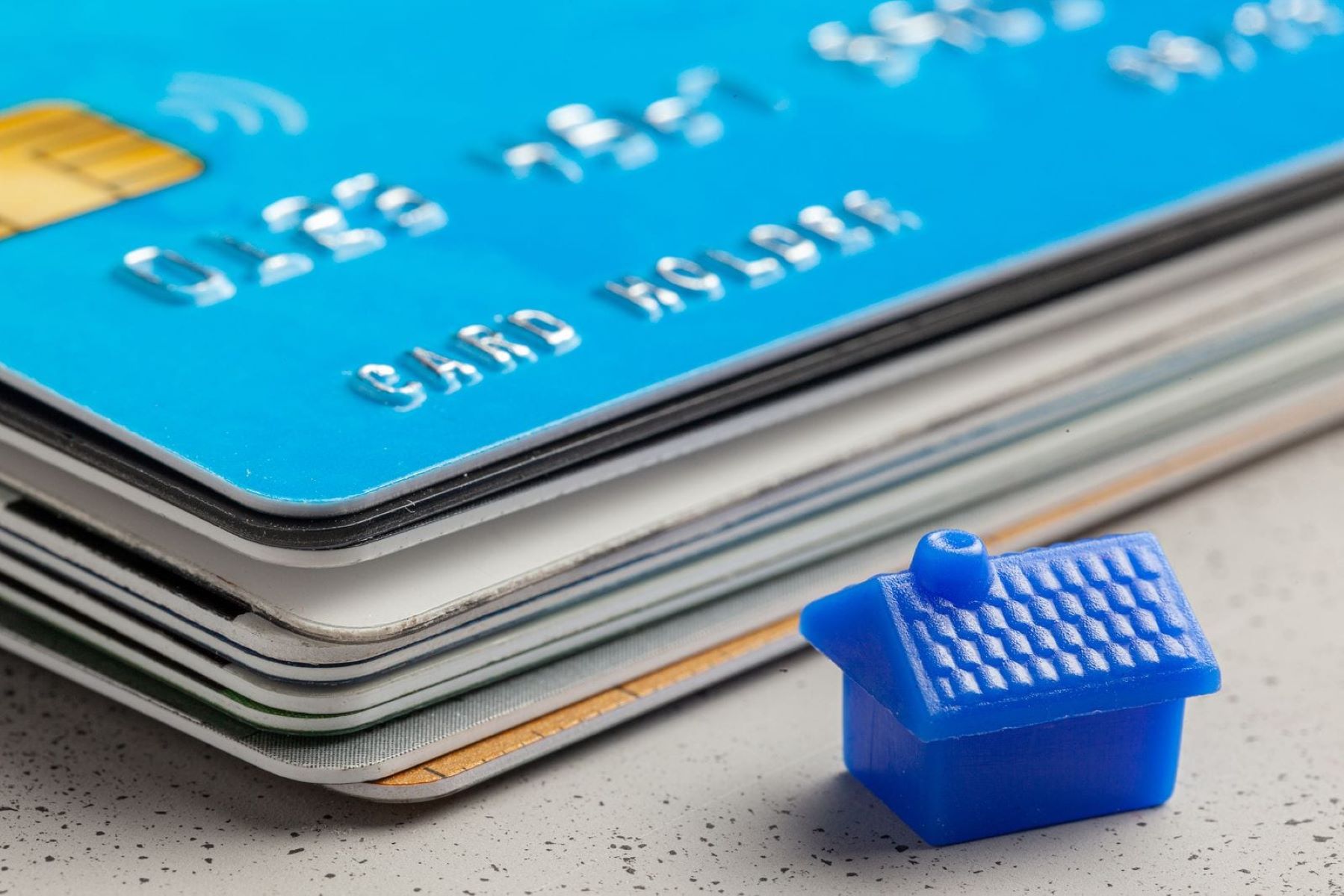

Finance
What Age Can You Start Building Your Credit
Published: January 5, 2024
Find out the right age to start building credit and get your finances on track. Discover expert advice and tips on finance for all age groups.
(Many of the links in this article redirect to a specific reviewed product. Your purchase of these products through affiliate links helps to generate commission for LiveWell, at no extra cost. Learn more)
Table of Contents
Introduction
Building credit is an essential aspect of personal finance. It plays a crucial role in determining our ability to secure loans, mortgages, and credit cards, as well as influencing our financial well-being in the long run. But at what age can you start building your credit?
Understanding the basics of credit and how it works is the first step to answering this question. In simple terms, credit is a financial tool that allows individuals to borrow money or access goods and services with the promise to repay in the future. Creditors, such as banks and lending institutions, assess the creditworthiness of individuals before granting them access to credit.
Several factors come into play when building credit, such as payment history, credit utilization, length of credit history, and types of credit used. These factors influence an individual’s credit score, which is a numerical representation of their creditworthiness. Higher credit scores generally indicate lower credit risk, making it easier to secure favorable loan terms and interest rates.
So, when is the right time to start building credit? The legal age to enter into a contract and apply for credit varies from country to country and even within states or provinces. In most cases, you need to be at least 18 years old to apply for credit independently. However, there are options available for younger individuals to start building credit as well.
In the following sections, we’ll explore the legal age to start building credit, different options for establishing credit at a young age, building credit as a minor, and crucial tips for responsible credit building. By the end, you’ll have a clearer understanding of how and when to start building credit to secure a strong financial future.
Understanding Credit
Before diving into the age at which you can start building credit, it’s important to grasp the fundamentals of credit. Credit is a system that allows individuals to borrow money or access goods and services on the condition that they will repay the borrowed amount with interest within a specified timeframe. It serves as a vital tool for financial transactions and can impact various aspects of your financial life.
When you apply for credit, lenders assess your creditworthiness to determine if they should extend credit to you. They evaluate various factors such as your payment history, credit utilization, length of credit history, and types of credit used. These factors are utilized to calculate your credit score, a three-digit number that represents your creditworthiness.
Your credit score is typically provided by credit reporting agencies such as Equifax, Experian, or TransUnion. The most widely used credit scoring model is the FICO score, ranging from 300 to 850. Higher credit scores indicate lower credit risk, making it easier to secure credit, obtain favorable interest rates, and access better financial opportunities.
Payment history, which includes whether you pay your bills on time, carries significant weight in determining your credit score. It accounts for approximately 35% of your FICO score. Consistently making timely payments will positively impact your credit score and demonstrate your responsible credit behavior.
Credit utilization, or the amount of credit you use compared to your total available credit limit, is another important factor that affects your credit score. To maintain a healthy credit score, it’s generally recommended to keep your credit utilization below 30%. For example, if you have a credit card with a $1,000 limit, you should aim to keep your outstanding balance below $300.
The length of your credit history also carries weight in your credit score calculation. Generally, a longer credit history is considered more favorable as it provides a track record of responsible credit management. It’s important to start building credit early and maintain it over time to establish a solid credit history.
The types of credit you use also influence your credit score. Having a mix of different types of credit, such as credit cards, installment loans, and mortgages, can demonstrate your ability to manage various financial obligations. However, it’s essential to use credit responsibly and not take on excessive debt.
By understanding the factors that contribute to your credit score, you can make informed decisions about credit utilization, payment history, and other aspects of credit management. Armed with this knowledge, you’ll be better equipped to navigate the age at which you can begin building credit.
Factors Affecting Credit Building
Several factors play a crucial role in determining how effectively you can build credit. Understanding these factors is essential for successfully establishing and maintaining a positive credit history. Let’s explore some of the key factors that can impact your credit-building journey.
1. Payment History: Your payment history is one of the most significant factors influencing your credit score. Consistently making on-time payments for bills, loans, credit cards, and other financial obligations demonstrates responsible credit behavior and boosts your creditworthiness. Late payments, missed payments, or defaults, on the other hand, can severely damage your credit score.
2. Credit Utilization: Credit utilization refers to the amount of credit you are currently using in proportion to your total credit limit. Keeping your credit utilization ratio low, ideally below 30%, demonstrates responsible credit management. High credit utilization can indicate financial stress and negatively impact your credit score.
3. Length of Credit History: The length of your credit history measures the time you have been using credit. Having a longer credit history generally works in your favor, as it provides a track record of your credit behavior. Lengthy credit history showcases your ability to manage credit responsibly over an extended period, increasing your creditworthiness.
4. Credit Mix: The types of credit you have can also influence your credit-building efforts. Having a diverse mix of credit, such as credit cards, loans, and mortgages, demonstrates your ability to handle different types of financial obligations. However, it’s important not to take on too much debt or acquire credit unnecessarily.
5. New Credit Applications: When you apply for new credit, potential lenders may conduct a hard inquiry into your credit report. Multiple inquiries within a short period can indicate a higher risk of financial instability, potentially impacting your credit score. It’s important to be selective and strategic when applying for new credit.
6. Public Records and Collections: Negative information like bankruptcies, liens, or collections can significantly harm your credit score. These records reflect financial challenges or failures to meet your financial commitments, making it difficult to build credit. It’s crucial to avoid such situations and address any issues promptly.
Understanding these factors allows you to take proactive steps to build and maintain a positive credit profile. By focusing on responsible credit use, consistent payments, and a diverse credit mix, you can improve your creditworthiness and set a solid foundation for your financial future.
Legal Age to Start Building Credit
The legal age to start building credit varies across different countries and jurisdictions. In most cases, individuals must be at least 18 years old to independently apply for credit. This age requirement is primarily due to contractual obligations associated with credit agreements. At 18, individuals are legally recognized as adults, capable of entering into binding contracts.
However, it’s important to note that the minimum age to apply for credit can vary within specific regions or states. Some jurisdictions may allow individuals to apply for credit at a younger age, typically with parental consent or a designated co-signer on the credit account. These options are often limited and subject to certain conditions.
For example, in the United States, the legal age to apply for credit is generally 18. However, the Credit Card Accountability Responsibility and Disclosure (CARD) Act of 2009 introduced some restrictions for individuals under 21. It requires individuals younger than 21 to either have a co-signer or demonstrate an independent ability to repay the credit card debt. This legislation aims to protect young adults from accumulating excessive debt without the means to repay it.
In Canada, the legal age to apply for credit independently also varies by province or territory. For most provinces and territories, 18 is the minimum age, while it is 19 in British Columbia and Newfoundland and Labrador.
Other countries may have different age requirements for credit applications. It’s important to consult local laws and regulations or seek advice from financial institutions to determine the legal age in your specific area.
While the legal age to start building credit may be 18 or older, it doesn’t mean that younger individuals are entirely excluded from credit-building opportunities. There are alternative options available for minors and young adults to begin establishing credit under adult supervision or with certain restrictions, which we’ll explore in the following sections.
It’s crucial to understand the legal requirements and limitations related to credit applications based on your jurisdiction. This knowledge will guide you in making informed decisions and setting realistic expectations for building credit at the appropriate age.
Different Options for Establishing Credit at a Young Age
While the legal age to independently apply for credit may be 18 in many countries, there are still options available for young individuals to start building credit at a younger age. These options often involve the involvement of a co-signer or require specific financial products designed for minors. Here are a few different options for establishing credit at a young age:
1. Secured Credit Cards: Secured credit cards are an excellent option for young individuals looking to build credit. These cards require a security deposit that acts as collateral for the credit limit. The deposit serves as a guarantee for the credit card issuer and reduces the risk associated with providing credit to someone with limited or no credit history. Secured credit cards can help young individuals establish a positive credit history by making regular payments and demonstrating responsible credit behavior.
2. Authorized User: Another option is to become an authorized user on someone else’s credit card account. Parents or guardians can add a young individual as an authorized user to their credit card account, allowing them to make purchases using the card. The payment history of the primary account holder is reported on the authorized user’s credit report, helping them establish a credit history. It’s crucial to choose a primary account holder with good credit habits to ensure positive credit impact.
3. Credit Builder Loans: Credit builder loans are specifically designed to help individuals establish credit. These loans work by depositing a set amount of money into a savings account or a certificate of deposit, which acts as collateral for the loan. The borrower then makes monthly payments towards the loan, building a positive payment history. Once the loan is repaid in full, the deposited funds are released, and a positive credit history is established.
4. Co-Signer or Joint Account: For young individuals who have a responsible adult willing to co-sign a loan or open a joint credit account, this can be an option to start building credit earlier. The co-signer or joint account holder shares the responsibility for the credit account and helps establish credit history for the young individual. It’s vital to maintain timely payments and responsible credit usage to avoid damaging the co-signer’s credit history.
5. Retail Store Credit Cards: Some retail stores offer credit cards specifically for young individuals. These cards often have lower credit limits and more accessible approval requirements, making them a viable option for establishing credit. It’s essential to use retail store credit cards responsibly and make timely payments to build a positive credit history.
It’s important to remember that whatever option you choose to establish credit at a young age, responsible credit behavior is key. Make sure to use credit wisely, make on-time payments, and keep credit utilization low to build a strong credit profile that will benefit you in the future.
Building Credit as a Minor
Building credit as a minor can be a unique challenge as many financial institutions have age restrictions on credit applications. However, there are still ways for young individuals to start building credit and set a strong foundation for their financial future. Here are some key considerations for building credit as a minor:
1. Open a Joint Account: If you have a trustworthy adult, such as a parent or guardian, willing to help, you can consider opening a joint credit account. By having your name tied to the account, you can begin building credit history as the account activity is reported to the credit bureaus. It’s important to choose a responsible co-account holder who can guide and ensure proper credit management.
2. Become an Authorized User: Ask a trusted adult, like a parent or relative, to add you as an authorized user on their credit card account. Being an authorized user allows you to make purchases using the card, and the credit history associated with that card will be reflected on your credit report. This can help you establish a positive credit history at an early age.
3. Student Loans: If you are pursuing higher education, you may be eligible for student loans. Although these loans require repayment, they are considered installment loans and can contribute positively to your credit history if you make regular payments. Responsible management of student loans can help you establish credit and demonstrate your ability to handle financial obligations.
4. Develop Responsible Financial Habits: Even without formal credit accounts, you can still practice responsible financial habits. Pay your bills on time, such as mobile phone bills or subscription services, as some utility companies report payment history to credit bureaus. While these may not directly contribute to building credit, they reflect your responsible financial behavior, which is crucial once you’re eligible for credit in the future.
5. Secure a Job or Income Source: Having a part-time job or other sources of income can demonstrate financial stability to potential lenders in the future. Consistent income showcases your ability to meet financial obligations, which can be advantageous when you’re ready to apply for credit independently.
6. Educate Yourself on Credit: Take the time to educate yourself about credit. Learn about credit scores, how they are calculated, and what factors affect them. Understand the importance of responsible credit use, managing debt, and the potential consequences of late payments or defaults. Equipping yourself with knowledge will empower you to make informed financial decisions in the future.
Building credit as a minor may require a bit more effort and creativity, but it’s not impossible. By leveraging joint accounts, becoming an authorized user, responsibly managing student loans, developing good financial habits, and educating yourself about credit, you can lay the groundwork for a healthy credit history that will serve you well as you transition into adulthood.
Tips for Responsible Credit Building
Building credit is a gradual process that requires discipline and responsible financial management. By following these tips, you can establish and maintain a positive credit history:
1. Pay on Time: Make all credit card payments, loan installments, and other bills on time. Late payments can harm your credit score and make it harder to obtain credit in the future. Set up reminders or automated payments to ensure you never miss a due date.
2. Use Credit Wisely: Avoid unnecessary debt and only use credit for essential purchases that you can afford to repay. Keep your credit utilization ratio below 30% by not maxing out credit cards or taking on excessive debt. Responsible credit use shows lenders that you can manage your finances effectively.
3. Monitor Your Credit: Regularly check your credit reports from credit reporting agencies like Equifax, Experian, and TransUnion. Look for any errors or discrepancies and report them to the credit bureau for correction. Monitoring your credit will help you spot any potential issues and ensure the accuracy of your credit report.
4. Diversify Your Credit Mix: Having a mix of different types of credit can positively impact your credit score. Consider having a combination of credit cards, installment loans, and other forms of credit. However, only seek credit that you truly need and can manage responsibly.
5. Don’t Close Old Accounts: When you pay off a credit card or a loan, it may be tempting to close the account. However, keeping old accounts open can benefit your credit history and lengthen your credit age. If the account has no annual fees or high-interest rates, it’s generally better to keep it open.
6. Limit Credit Applications: Avoid applying for multiple new credit accounts within a short period. Each credit application results in a hard inquiry on your credit report, which can temporarily lower your credit score. Be selective when applying for credit and only pursue opportunities that you genuinely need.
7. Build an Emergency Fund: Having an emergency fund can help you avoid relying heavily on credit in times of unexpected expenses. Aim to save three to six months’ worth of living expenses in an easily accessible account. This provides a safety net, reducing the need to rely on credit for unforeseen circumstances.
8. Seek Professional Advice: If you are uncertain about the best credit-building strategies for your situation, consider seeking advice from a financial advisor or credit counselor. They can provide personalized guidance and help you navigate the complexities of credit building.
Responsible credit building is a long-term commitment. By implementing these tips, you can establish a solid credit foundation and pave the way for future financial success. Building good credit habits early on will benefit you in the long run, enabling you to access better loan terms, secure favorable interest rates, and achieve your financial goals.
Conclusion
Building credit is a vital aspect of personal finance that can significantly impact your financial well-being and opportunities. While the legal age to start building credit is typically 18, there are options available for young individuals to establish credit earlier. Whether through secured credit cards, authorized user status, credit builder loans, or joint accounts, there are avenues to begin building a positive credit history.
Understanding the factors that affect credit building, such as payment history, credit utilization, credit mix, and length of credit history, is essential for establishing and maintaining a strong credit profile. By practicing responsible credit management, making timely payments, and using credit wisely, you can build a positive credit history and increase your creditworthiness.
It’s important to educate yourself about credit and stay informed about local laws and regulations that govern credit applications for minors. By starting early and developing responsible financial habits, young individuals can set a solid foundation for their financial future and increase their financial opportunities as they grow older.
Remember, building credit takes time and patience. It’s a journey that requires discipline and responsible financial management. By following the tips for responsible credit building, such as paying on time, using credit wisely, monitoring your credit, and seeking professional advice when needed, you can navigate the credit system successfully and achieve your financial goals.
Building credit is not just about numbers—it’s about creating a positive relationship with money and demonstrating your ability to manage financial responsibilities. With a strong credit history, you can secure better loan terms, obtain favorable interest rates, and gain access to various financial opportunities that will positively impact your life.
So, whether you’re just starting out as a young individual or looking to improve your credit standing, remember that building credit is a long-term commitment. By adopting responsible credit practices and making informed financial decisions, you can shape a bright financial future and pave the way for financial success.














